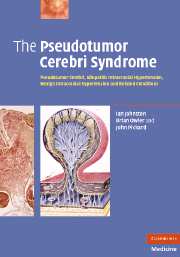 The Pseudotumor Cerebri Syndrome
The Pseudotumor Cerebri Syndrome Published online by Cambridge University Press: 21 August 2009
The syndrome we have termed the pseudotumor cerebri syndrome (PTCS) was first characterized as a distinct clinical entity in the papers by Quincke and Nonne, published a little over a hundred years ago. The condition has subsequently received a somewhat bewildering variety of names and its mechanism has also remained controversial. Moreover, it is probably not as rare as was originally thought. In addition, the insights gained by the study of its pathophysiology and management undoubtedly have more general implications for our understanding of intracranial dynamics in other conditions. For these reasons, and because there has been a considerable proliferation of literature on the subject in recent decades, we thought it would be timely to bring together the later observations with the extensive older literature.
The original intention was to have this book ready for publication in 2004 to mark the centenary of Nonne's paper which introduced the name ‘pseudotumor cerebri’ for a condition sporadically described during the four decades prior to that paper. Like many such endeavours, the present work took rather longer to complete than initially anticipated. Nonetheless, the belated acknowledgement of Nonne's paper does signify one of the central arguments of this monograph – that the name he proposed for the condition, a name that has endured despite many challenges, should be retained. The only proposed modification is the addition of the term ‘syndrome’ to embrace the collection of conditions which, in practice, share a common presentation, clinical picture, treatment strategy, and outcome, as well as, it is argued, a common mechanism.
To save this book to your Kindle, first ensure [email protected] is added to your Approved Personal Document E-mail List under your Personal Document Settings on the Manage Your Content and Devices page of your Amazon account. Then enter the ‘name’ part of your Kindle email address below. Find out more about saving to your Kindle.
Note you can select to save to either the @free.kindle.com or @kindle.com variations. ‘@free.kindle.com’ emails are free but can only be saved to your device when it is connected to wi-fi. ‘@kindle.com’ emails can be delivered even when you are not connected to wi-fi, but note that service fees apply.
Find out more about the Kindle Personal Document Service.
To save content items to your account, please confirm that you agree to abide by our usage policies. If this is the first time you use this feature, you will be asked to authorise Cambridge Core to connect with your account. Find out more about saving content to Dropbox.
To save content items to your account, please confirm that you agree to abide by our usage policies. If this is the first time you use this feature, you will be asked to authorise Cambridge Core to connect with your account. Find out more about saving content to Google Drive.